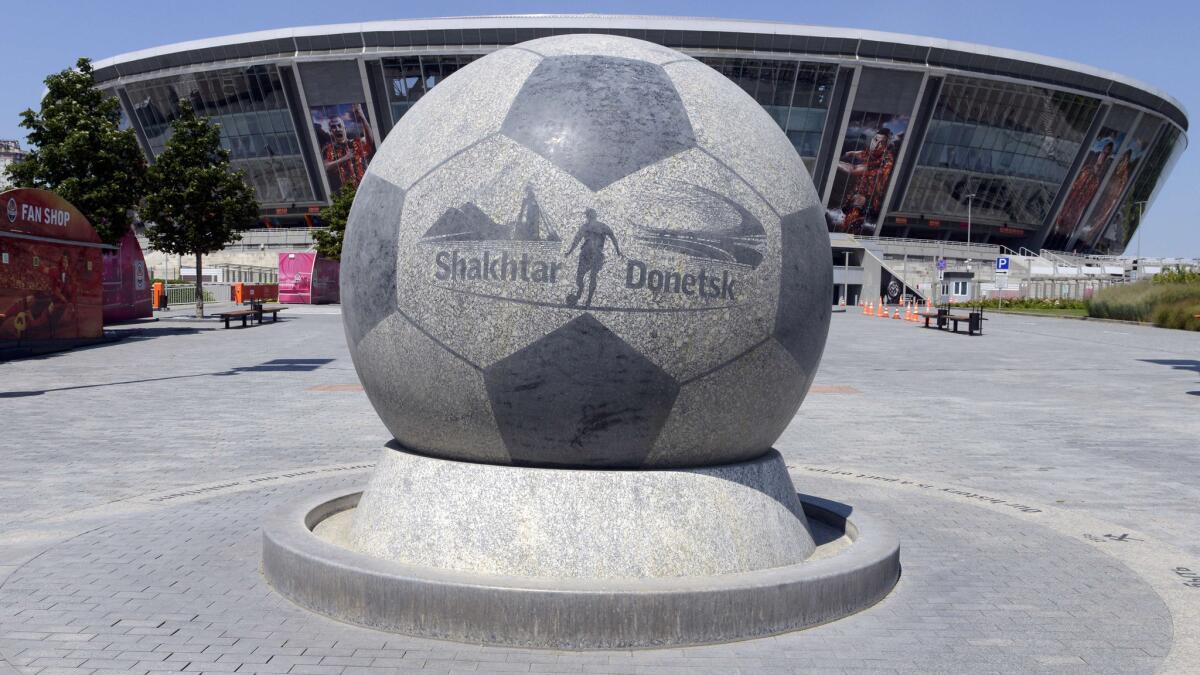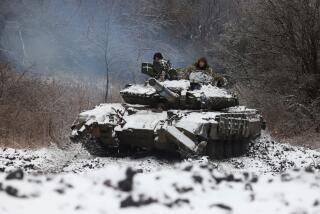Ongoing conflict in Ukraine wreaks havoc on country’s Premier League

The casualties of war are many.
Lives lost or destroyed. Cities leveled. Societies ripped apart.
The disruption of a soccer league is a minor inconvenience by comparison. But it is also a reminder how important the rituals, rhythms and distractions people once took for granted can be — especially at a time when those distractions are needed most.
For the record: This report incorrectly stated that businessman Rinat Akhmetov has been “linked to organized crime.” Akhmetov has never been charged with any crime, and his representatives deny any connection.
The ongoing conflict in the Ukraine has killed more than 3,500 and interrupted normal life in countless ways over the last eight months, not the least of which is the havoc is has caused in the country’s Premier League, which seemed poised to become one of the world’s elite.
The Union of European Football Associations (UEFA) ranks the Ukrainian league as the eighth-best on the continent, ahead of the Dutch Eredivisie and Belgium’s Pro League. And until last spring it was seen as an important bridge for players moving from small teams in Africa and Latin America toward big contracts with major European teams.
But it has been weakened since the annexation of the Crimea last March led to war between the Ukraine and Russian-backed rebels. Three teams — Tavriya Simferopol, F.K. Sevastopol and Zhemchuzhina Yalta — were absorbed by the Russian league system, shrinking the Premier League from 16 to 14 clubs and making it one of the smallest first-division leagues in Europe. And the fighting forced five other Eastern teams to retreat west for safety.
Zorya, based closest to the Russian border, saw its stadium heavily damaged by mortar fire that left a crater in the center of the field. It now plays in Zaporizhia, on the banks of the Dnieper River in the southeastern part of the country.
“Things have escalated,” Irish defender Darren O’Dea, one of several foreign-born players to flee the Ukrainian league, told the BBC after leaving Metalurh Donetsk in August.
O’Dea, who played one season for Toronto in Major League Soccer, described Donetsk as a lawless place where pro-Russian soldiers act with impunity, seizing cars, clothes and food at will. O’Dea retreated to the team’s training grounds for a time last season, living in the compound and keeping tabs on who had the upper hand in the conflict by looking to see whether a Russian or a Ukrainian flag topped government buildings.
Metalist, based in Kharkiv, 25 miles from the Russian border, also lost four foreign players when they refused to return for the start of the season while another, Brazilian-born midfielder Edmar, was called up by the Ukrainian Army.
Donetsk, where O’Dea played, was an industrial hub with about 1 million people and three soccer cities when the war began. It has since fallen into the hands of the separatists, forcing hundreds of thousands of people — and all three teams — to flee.
“The situation is far from ideal,” said Manuel Veth, who is researching the economics and politics of Soviet and post-Soviet soccer at King’s College in London and is chief contributor to the website futbolgrad.com.
One of the teams that fled Donetsk is Shakhtar, the league’s richest and more successful franchise. It is owned by billionaire businessman Rinat Akhmetov, a former member of parliament who has, at various times, been linked to organized crime, disgraced former president Viktor F. Yanukovych and the separatists. With his soccer team, however, Akhmetov has spent lavishly on both players and training facilities and he’s been rewarded with eight league titles — including the last five in a row — six Domestic Cups, four Super Cups and the UEFA Cup since 2002.
Last season ,the team won its second consecutive treble, capturing the league title and both the Domestic and Super cups. And with a roster that includes 13 Brazilians — among them World Cup players Fred and Bernard — Shakhtar appeared poised for another big year.
But there was trouble before this season even started, with six South American players initially refusing to accompany the team back to the Ukraine following a July friendly in France. Now, nearly a third of the way into the season, the team is winless in Champions League play and third in the league table following a second straight loss last weekend, this one to Dynamo Kyiv.
Shakhtar lost just five times in 28 league games last season.
The war is never far away for Shakhtar, whose training base was shelled and its modern 50,000-seat stadium damaged. For a time last month armed invaders — from which side no one immediately knew — occupied its administrative building.
So the players and the team’s staff live out of suitcases in a Kiev hotel more than 400 miles from Donetsk and play most of their home games even farther west in Lviv, near the Polish border. When they played Olimpik, another displaced team, last month, the game drew 1,200 fans, a painfully small crowd by Shakhtar’s standard.
A year ago Shakhtar averaged 35,000 at home, setting an Eastern European record by selling 27,000 season tickets.
Whether the league will be able to continue playing remains an open question. Political unrest in Egypt caused that country’s Premier League to cancel parts of two seasons but Veth isn’t sure such drastic measures are needed in the Ukraine -- yet.
“There was a time in September where I thought that is seemed risky to start the league and play should have perhaps been suspended,” said Veth, who stresses the Ukraine is a large country where many have gotten no closer to the conflict than their TV screens. “On the other hand the league has gone underway and the Ukrainian football federation has managed to organize a competition in which players and fans are safe.
“But if the conflict does indeed once again fully escalate, the current season might be in danger. The conflict in Ukraine has been somewhat unpredictable and it very hard to judge which way it will go. I would not be surprised if tomorrow there will be a peaceful solution or if the current conflict becomes an all-out war once again.”







